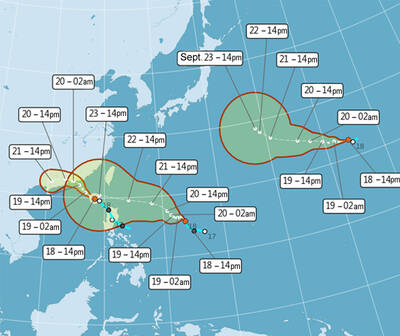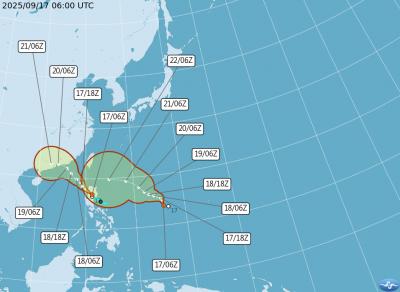Chinese National Party (KMT) presidential candidate Ma Ying-jeou (
Earlier yesterday, Ma had publicly denied having a green card, saying that "no members of his family possessed one."
In the declaration yesterday evening Ma said because his eldest daughter, Lesley Ma (
"However no other members of my family possess a US passport, not myself, my wife, or my youngest daughter, nor have we applied for one," he said.
Ma did admit that during his stay in the US he applied and obtained a green card, around 1977, in order to get student loans and employment after graduation.
He said that he ceased using his green card in the late 1980s and had applied for visas via the American Institute in Taiwan when traveling to the US, which "by American law, would be seen as giving up the green card."
"Both my wife's and my green card became invalid this way; my younger daughter, on the other hand, has never had a green card," he said. "Since both myself and my wife have given up our green cards for more than 20 years, when I was asked about it yesterday, I naturally said that I did not have a green card."
Earlier in the day, when he was approached for comment in Tainan, Ma said: "I've already answered the question and today's newspapers also ran stories with my response. No one in my family has a green card."
Ma then urged Hsieh to respond to a question he asked on Sept. 29 regarding why Hsieh could not urge the government to immediately allow direct cross-strait transportation and investment from China.
Ma said he always responded to Hsieh's questions quickly, while Hsieh failed to reciprocate.
Earlier yesterday Hsieh had raised the green card issue again.
"[Whether you have a green card] is such a simple question. Why can't Ma answer the question in person? If Ma lied about this, he should drop out of the election," Hsieh said.
Hsieh raised the same question on Sunday as he registered his candidacy, but it was Wang Yu-chi (
At a press conference held to declare his clean politics election platform, Hsieh persisted in questioning Ma, saying he would pursue the issue until Ma had provided a response.
"I didn't question Ma about the green card for no reason. Maybe he has spent the past two days trying to find a way with his lawyers to have the card revoked," Hsieh said.
"Ma keeps saying he is closely bound to the fate of Taiwan. If a presidential candidate holds a US green card or is able to apply for dependent status, it would be just like wearing a life jacket. His pledge was merely pretense," Hsieh said.
Later yesterday, after Ma had rebutted the allegations, Hsieh asked Ma to specify the date since when Ma and his family members had not had US green cards.
"Did Ma mean that he never owned a green card, doesn't have a green card now, or that his green card has been revoked?" Hsieh said.
Hsieh said his campaign office had obtained information from different informants and would make it public once it had been verified, adding that some of the information provided "quite detailed information," including the card numbers.
Meanwhile, Hsieh vowed to set up an independent government agency, modeled on Hong Kong's Independent Commission Against Corruption if elected.
Hsieh said he would also push for the passage of a series of "Sunshine laws" to create a clean political climate and advocate judicial reform.
Additional reporting by staff writer

NEW AGREEMENT: Malaysia approved imports last year after nearly two years of negotiations and inspections to meet quarantine requirements, officials said Up to 3.6 tonnes of pomeloes from Taiwan cleared Malaysian customs on Friday, in the first shipment of Taiwanese pomeloes to Malaysia. Taiwan-grown pomeloes are popular in domestic and overseas markets for their tender and juicy taste, the Ministry of Agriculture’s Animal and Plant Health Inspection Agency said. The fruit is already exported to Japan, Canada, Hong Kong, Singapore and the Philippines, it added. The agency began applying for access to the Malaysian market in 2023, compiling data on climate suitability, pests and diseases, and post-harvest handling, while also engaging in nearly two years of negotiations with Malaysian authorities and submitting supplementary

PEAK MONTHS: Data showed that on average 25 to 27 typhoons formed in the Pacific and South China seas annually, with about four forming per month in July and October One of three tropical depressions in the Pacific strengthened into a typhoon yesterday afternoon, while two others are expected to become typhoons by today, Central Weather Administration (CWA) forecaster Lee Ming-hsiang (李名翔) said yesterday. The outer circulation of Tropical Depression No. 20, now Typhoon Mitag, has brought light rain to Hualien, Taitung and areas in the south, Lee said, adding that as of 2pm yesterday, Mitag was moving west-northwest at 16kph, but is not expected to directly affect Taiwan. It was possible that Tropical Depression No. 21 would become a typhoon as soon as last night, he said. It was moving in a

One of two tropical depressions that formed offshore this morning could turn into a moderate typhoon by the weekend, the Central Weather Administration (CWA) said today. Tropical Depression No. 21 formed at 8am about 1,850km off the southeast coast, CWA forecaster Lee Meng-hsuan (李孟軒) said. It is expected to move in a northwesterly direction as it continues building momentum, possibly intensifying into Typhoon Mitag this weekend, she added. The radius of the storm is expected to reach almost 200km, she said. It is expected to approach southeast of Taiwan on Monday and pass through the Bashi Channel between Tuesday and Wednesday,

Tigerair Taiwan and China Airlines (CAL) today announced that several international flights were canceled or rescheduled due to Typhoon Ragasa. The Central Weather Administration (CWA) has maintained sea and land warnings for the typhoon. Its storm circle reached the Hengchun Peninsula (恆春半島) on Taiwan's southern tip at 11am today. Tigerair Taiwan said it canceled Monday's IT551/IT552 Taoyuan-Da Nang, IT606/IT607 Taoyuan-Busan and IT602 Taoyuan-Seoul Incheon flights. Tomorrow, cancelations include IT603 Seoul Incheon-Taoyuan, as well as flights between Taoyuan and Sapporo, Osaka, Tokyo Narita, Okinawa, Fukuoka, Saga, Tokyo Haneda, Nagoya, Asahikawa and Jeju. On Wednesday, the IT321/IT322 Kaohsiung-Macau round-trip would also be canceled. CAL announced that today's